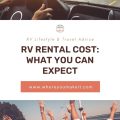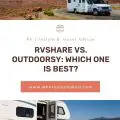Hey! This site is reader-supported and we earn commissions if you purchase products from retailers after clicking on a link from our site.
As platforms such as Airbnb and Turo gain popularity, it makes sense that the structure would also apply to RV rentals. While Airbnb and Turo don’t focus on RVs, you can use other platforms to list or rent an RV.
If you’re an owner, you can make a little money and keep your RV on the road more. And renters can find an RV that fits their budget and size needs. But is there a catch to using one of these platforms? Keep reading to learn more about peer-to-peer RV sharing.
Table of Contents
- What is Peer-to-Peer RV Sharing?
- What Can You Share Peer-to-Peer?
- Who Are the Major Peer-to-Peer RV Rental Platforms?
- Who Can Participate in These Platforms?
- Is There Insurance Coverage?
- What Are the Cancellation and Refund Policies?
- Can You Set Other Rules?
- Should You Read Reviews?
- How Much Do Peer-to-Peer RV Rentals Cost?
- How Much Do Owners Earn?
- Is It a Good Option for RV Owners?
- Is It a Good Option for RV Renters?
- What’s the Catch?
What is Peer-to-Peer RV Sharing?
Peer-to-Peer RV rentals are when individuals who own RV put their vehicles up for private rentals. The process works similarly to Airbnb and other peer-to-peer rental options.
As an owner, you can rent out your RV and make a little money. And as a renter, you can find the perfect RV for your next trip, and you can support another individual. You can search for RVs by location, size, price, and other features. That way, you can find the right RV for your needs.
Peer-to-peer RV sharing can be an excellent option for anyone looking to borrow an RV for a single trip or vacation. And it’s great for owners who want to make a little extra cash each month.
What Can You Share Peer-to-Peer?
You can share many different vehicles peer-to-peer. Owners can rent out vehicles such as travel trailers, pickup campers, vintage vans, Sprinter vans, motorhomes, and RVs, of course.
You can also rent out toy haulers and off-road SUVs. If you want to share your RV or a similar vehicle with others, peer-to-peer is a great way to do it.
Owners can control who can rent their equipment, so you can make sure you trust the renter. Renters can read reviews so that they choose a reliable owner.
Who Are the Major Peer-to-Peer RV Rental Platforms?
The major peer-to-peer RV rental platforms are RVShare and Outdoorsy. RVShare started in 2012 and has had over a million days worth of rentals across the platform. The platform has over 60,000 RVs that you can rent in any state and DC.
You can choose from more affordable to more luxury RVs. RVShare offers pet-friendly options, and they will even deliver your RV. Then, you don’t have to worry about traveling to pick it up from the owner.
Read my full RVShare review for more.
Outdoorsy also offers RV deliveries, and they have rentals available in the United States, Canada, and Australia. Most of the reviews on Outdoorsy are a perfect five stars. You can view my opinion on them in my Outdoorsy review.
Both companies offer free roadside assistance, so you can get the help you need. Then, you don’t have to worry about getting stuck on the road after a flat tire. You can consider both platforms for renting or listing an RV so that you can choose the right platform for you.
Who Can Participate in These Platforms?
To participate in peer-to-peer RV sharing, an owner should have a good driving record. The rules for participating on RVShare depend on the state where you want to rent the RV. In most cases, you should be able to rent as long as you’re over 25 and have a good driving history.
If you want to rent or list your RV on Outdoorsy, you will need to pass a DMV background check. Domestic and international renters will need to have a DMV check before participating on the platform. Reasons for failing include a DUI, a suspended license, or having more than two speeding citations in the last year.
On both platforms, owners can accept or deny rental requests, so you can determine who can rent your RV in particular. If you don’t care as much about requests, you can also set your account to book rentals instantly.
As long as you’re a good driver and can rent a car, you can probably rent an RV. Owners can choose renters that are trustworthy, and renters can look for owners with good reviews.
Is There Insurance Coverage?
Another thing to consider when listing or renting an RV is if you will have insurance. Outdoorsy and RVShare both offer insurance. When using Outdoorsy, owners can take advantage of the company’s $1 million liability coverage.
You also have coverage in the case of damage or theft. The coverage applies whenever anyone rents your RV. Coverage costs for renters can vary based on the location and the RV value.
RVShare also has a $1 million liability policy, as well as up to $200,000 in collision coverage. The insurance is free for owners, but you’ll need to accept it and activate it. But you can also use your own insurance policy.
Renters who get an RV with the company’s insurance get collision and comprehensive coverage. The company will charge renters an extra $10 to $40 per day for the coverage.
What Are the Cancellation and Refund Policies?
On RVShare, if an owner cancels a reservation, the company will refund the entire amount to the renter. They’ll also help the renter find another RV. RVShare will also help renters if the RV they rent was misrepresented online and they couldn’t contact the owner.
Renters with Outdoorsy can cancel for free for 48 hours after booking as long as you’re booking at least 14 days out. If you cancel more than five days out, you can get a refund on everything except the service fee.
Canceling at least 5 days out will get you a 75 percent refund on your booking and a refund on your insurance.
Owners can also opt for stricter cancellation policies. Outdoorsy will enforce the policies that owners set to protect both owners and renters.
Can You Set Other Rules?
As an owner, you can set rules for your RV. You can create rules regarding pets and where they can be in your RV. Make your rules as clear as you can in advance so that renters will know to follow them.
Should You Read Reviews?
As a renter, you should read reviews before selecting an RV. While both RVShare and Outdoorsy verify owners, you may want to research yourself. Then, you can make sure you choose the right RV rental for you.
How Much Do Peer-to-Peer RV Rentals Cost?
Rentals on RVShare cost anywhere from about $50 to as much as $1,000 per night. Outdoorsy rentals cost about $25 to $600 per night. Either way, exact RV rental prices can vary based on your location, the size, and the amenities you want.
Consider looking for RVs near you and near your destination. Then, you may be able to save money by renting for fewer nights.
How Much Do Owners Earn?
Owners on RVShare can earn up to $60,000 per year when renting a Class C Motorhome. Smaller RVs can still earn owners about $20,000 to $40,000 each year. RVShare will keep about 15 to 20 percent of reservation costs.
On Outdoorsy, owners can earn up to $50,000 a year or more. The platform will keep about 20 percent of the rental cost. In both cases, you can list your RV for free, the platforms will only make money when you make money.
Is It a Good Option for RV Owners?
In general, an RV rental marketplace is a good option for RV owners. For one, you can keep your RV out of storage space, so you don’t have to pay just to store it. And if you’ve kept your RV on your driveway, you can get some of that space back.
Of course, there’s also the benefit of being able to make money. You don’t have to do much to make some extra cash. However, you should take good, representative pictures of your RV. That way, you won’t mislead renters.
You can also control who can rent your RV. When you get a new request, you can accept or deny it based on the renter or the booking date, such as if you want your RV on a certain day.
Or you can let your RV rentals run on autopilot with instant booking. If you don’t want to review renters first, you can save a lot of time.
Is It a Good Option for RV Renters?
If you want to rent an RV, peer-to-peer is an excellent choice. You can get a much better deal than by using a traditional rental company or buying an RV yourself. Peer-to-peer platforms have RVs of all sizes and prices.
RV rentals are available all over the country, so you can probably find one near you or your destination. Then, you can determine if you want to use your RV for the whole trip or a few nights.
Both RVShare and Outdoorsy provide fantastic service to renters, both of them are two of my top picks for the best RV rental companies. Whether you get a flat tire or in an accident, both companies offer insurance and roadside assistance.
You can also read reviews for different RV owners. While peer-to-peer platforms verify owners, you can be extra sure that you rent from someone trustworthy. Then, you can have a comfortable, safe vacation.
What’s the Catch?
There is no big catch to using peer-to-peer RV sharing. Platforms like RVShare and Outdoorsy allow owners to list their RVs and make some money. The companies then help renters find the perfect RV for their next trip. Of course, like any peer-to-peer platform, there’s always a risk that the renter might not treat your RV well, or that an owner could misrepresent their vehicle. However, the protections put in place by RVShare and Outdoorsy should give you some peace of mind.
Whether you want something small or something more luxurious, you can find the perfect RV. You can also shop around for the best deal, and you can find an RV near you. Peer-to-peer RV sharing is a great option for owners and renters alike.




